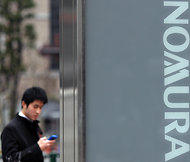 Tomohiro Ohsumi/Bloomberg NewsA branch of Nomura Securities in Tokyo.
Tomohiro Ohsumi/Bloomberg NewsA branch of Nomura Securities in Tokyo.
LONDON — Jasjit Bhattal, chief executive of Nomura Holding’s wholesale banking division, retired on Tuesday after less than two years in the position.
The sudden departure is a blow to Nomura’s attempts to expand in global financial markets.
Mr. Bhattal was the first non-Japanese person to sit on Nomura’s executive board. He joined the bank in 2008 from Lehman Brothers after Nomura bought the European and Asian operations of Lehman after it collapsed.
Revolving Door
View all posts
Based in Hong Kong, Mr. Bhattal, who was also deputy president of Nomura, was in charge of efforts to expand the wholesale banking unit, which has continued to struggle against international competitors.
As part of an effort to streamline operations last year, Nomura announced $1.2 billion of cuts, mostly in Europe, where it currently has 4,500 employees. In the three months ended Sept. 30, Nomura posted a net loss of $591 million, its first quarterly loss in more than two years.
“Jesse has had a distinguished career, spanning nearly three decades in the industry,” Nomura’s chief operating officer, Takumi Shibata, said in a statement. “We would like to thank him for his contribution in leading the wholesale business through exceptionally difficult markets.”
Mr. Shibata will manage Nomura’s wholesale banking division on an interim basis.
Article source: http://feeds.nytimes.com/click.phdo?i=90b6f7d9f9c4e6b81ad97b6109694fab
